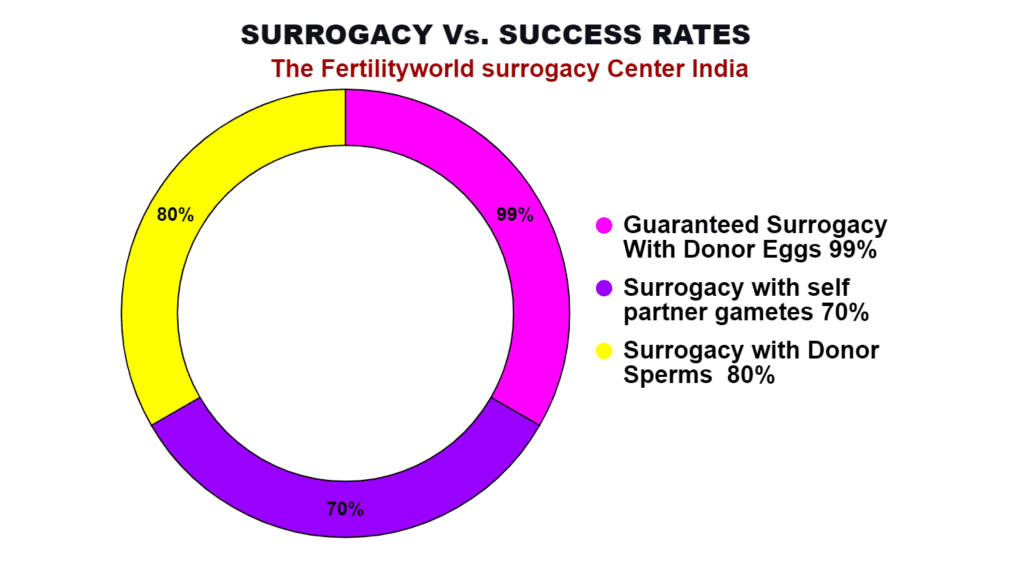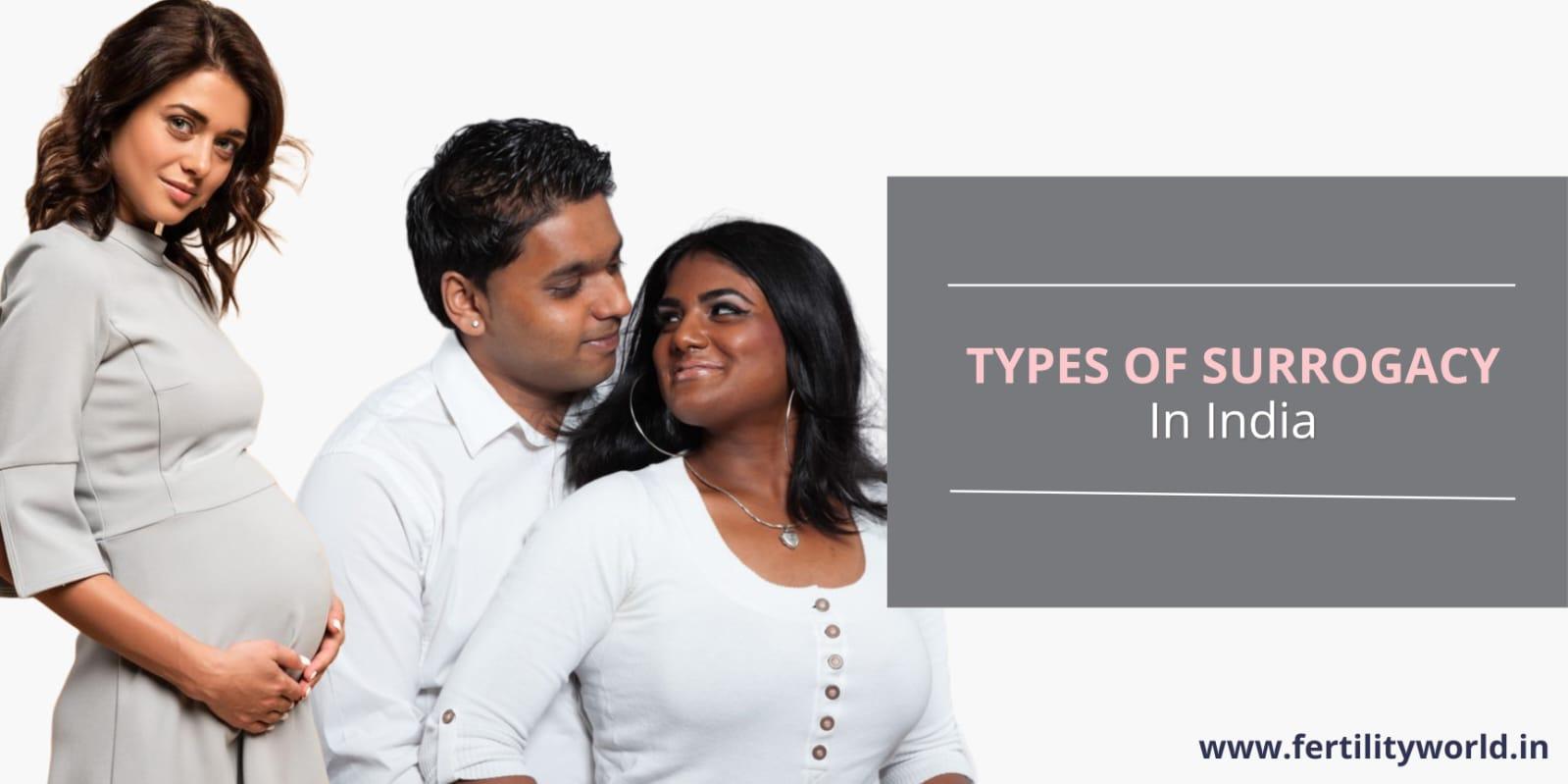The Fertility World Surrogacy Center wishes all intending parents a successful family Building!
- The Fertility World is the leading Surrogacy Center in pan India.
- Offering surrogacy at the lowest cost from Rs. 15 lakhs onwards.
- Only Altruistic surrogacy is legal to practice in India (New law 2022).
- Guaranteed surrogacy package available with 100% surety of baby.
- Free consultations: Book an appointment: Talk to our Doctors & Lawyers.
- Call/W: +91 9311850412 Email: info@fertilityworld.in

Before we make you understand the types of Surrogacy, it is of utmost importance to understand…
What exactly does surrogacy mean to you?

Generally, Surrogacy means a woman called the surrogate mother carries the pregnancy and gives birth to a baby for another person or couple (intending people).
Now, let us understand…
There are two types of surrogacy
Full surrogacy (also known as host or gestational surrogacy) is when the eggs of the intended mother or a donor are used and there is, therefore, no genetic connection between the baby and the surrogate. Partial surrogacy (also known as straight or traditional surrogacy) involves the surrogate’s egg being fertilized with the sperm of the intended father.
Now, let us understand the types of surrogacy in detail…
- Traditional Surrogacy: In this type of surrogacy, it requires the surrogate mother to be artificially inseminated with the intended father’s sperm. Here, the surrogate’s eggs are fertilized with the intended father’s sperm. Thus, she is the genetic mother of the child to whom she gives birth.
As you can imagine, this surrogacy can be very complicated both emotionally and legally. Therefore, traditional Surrogacy has become widely phased out today.
A traditional surrogate mother is the biological mother of the child because her egg is combined with the intended father’s or donor’s sperm for fertilization to generate an embryo. This is the type of surrogacy that has been practiced the longest. Before modern technology allowed for the creation of embryos outside the womb, it was the only way to conceive via surrogate mother.
Now that the means do exist to use the intended mother’s or a donor’s egg, traditional surrogacy is much rarer. The potential legal and emotional implications are often enough of a deterrent; there is little protection to prevent a traditional surrogate from claiming the child as her own, or for a surrogate to be left responsible for medical costs for herself and the child.
In some of the states, traditional surrogacy is actually against the law.
- Gestational Surrogacy: Gestational surrogacy is a more modern recommended surrogacy today and this method alone is performed by most surrogacy services providers today. In this gestational surrogacy, an In-Vitro Fertilization (IVF) technique allows fertility doctors to fertilize eggs from the intended mother using sperm from the intended father. The sperm and eggs can also be supplied by donors for fertilization. The fertilized eggs are then implanted into the surrogate’s uterus, therefore the surrogate is not biologically linked to the surrogate baby, she is strictly the carrier.
Note: This gestational surrogacy is the only kind of surrogacy that is done at the Fertility World Surrogacy Center.
Today, due to medical science in the field of fertility enables a surrogate mother to carry the embryo of another intended couple. She is called a gestational surrogate or gestational carrier and she is not the child’s genetic mother. This is the most common form of surrogacy and provides the most solid legal protection for both intended parents and the surrogate.
- Altruistic Surrogacy: In an altruistic type of surrogacy arrangement, the surrogate mothers are not compensated for their time, risk, or effort. However, this Altruistic Surrogacy can apply to both traditional surrogacy and gestational surrogacy. This form of surrogacy is the only legal type in certain countries.
In this method of altruistic surrogacy, a woman agrees to become a surrogate without being compensated. In most surrogacy arrangements, the surrogate receives compensation for her time and effort on top of general costs related to the pregnancy. Altruistic surrogates are typically helping someone they know, such as a close friend or family member, and will likely only receive reimbursement for medical costs.
- Independent Surrogacy: In this kind of surrogacy usually independent surrogates are women who volunteer to offer surrogacy services without enlisting the help of a surrogacy service provider. However, this type of surrogacy arrangement is among the riskiest due to the lack of screenings for protection.
Much like traditional surrogacy, independent surrogacy runs a whole host of legal risks. An independent surrogate works without the support of an expert, often going through the process for someone she already knows. And while it may seem reasonable to take the fertility experts’ services out of the equation. When the process gets complicated and emotions run high, the expert is there as an added layer of support and protection for both parties.
- Commercial Surrogacy: The term commercial surrogacy does not imply in any forms of surrogacy. Its definition simply means any surrogacy arrangements mentioned above (except altruistic surrogacy, where surrogate volunteers carry a pregnancy for intended couples without compensation) can be defined as commercial surrogacy only if the surrogate mother is compensated financially apart from its medical expenditure reimbursement.
Note:
- It is unfair for a woman to carry a baby for someone else and get nothing in return.
- The Fertility World Surrogacy Center offers surrogate mothers at the lowest cost up to Rs. 5 lakhs only.
Commercial Surrogacy has been allowed in India since 2002. However, only gestational surrogacy is permitted as a legal surrogacy operation in India.
Who should go for Gestational Surrogacy?
Gestational Surrogacy is an alternate option for women with a medical condition that makes it impossible or dangerous to get pregnant and give birth. The mentioned below can be the reasons for infertility:
- Absence or malformation of the womb
- Recurrent pregnancy loss
- Repeated in vitro fertilization (IVF) failures.
- Aging women above 35 years
- It’s also a popular option for male same-sex couples who want to have a family and can be used by single people.
- Unexplained fertility issues.
How is a surrogate mother arranged?
Some intending people arranged a surrogate from among their family members or friends. This can be a good solution as there should already be a lot of trust between you, also it saves time and money.
If using a friend or family member isn’t an option, or you’d prefer to use someone you don’t know, you’ll need to do your research. The Fertility World will provide you with the best healthy surrogates from its surrogate database for you to choose from. A good place to start would be us.
The Fertility World Greatly recommends all intending couples seek help from fertility experts to legally achieve successful surrogacy. Most of the couples try to arrange their surrogacy and go for independent surrogacy but most of them fail to achieve their family extensions. Why? Because a little knowledge can cost you more and the guides from the experts will relieve your emotions and give you a beautiful healthy child.
How is surrogacy processed in the Fertility World?
Surrogacy is a complex and complicated procedure to go it alone; from medical decisions to insurance to compensation, to finding the surrogate, legal issues are done and can find a solution for even the most challenging situation.
Here at The Fertility World surrogacy center, we have the experience, knowledge, and high-tech resources to guide you at every turn, in every corner from scratch. If you’d like to learn more about how we can support your surrogacy journey, you are always welcome to book an appointment for your quick positive response.
Today, we’re offering free consultations, unlike other centers which can charge you up to Rs. 5000 with every consultation. You’re also eligible to get a concession of up to 15% from the inclusive package for surrogacy.



One thought on “Types of Surrogacy in India”